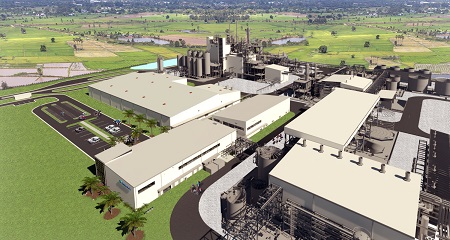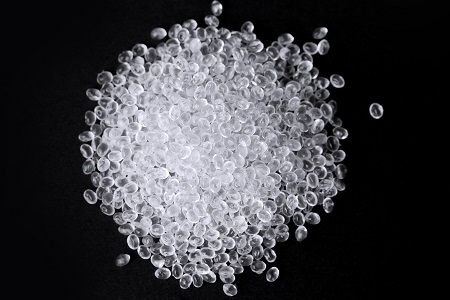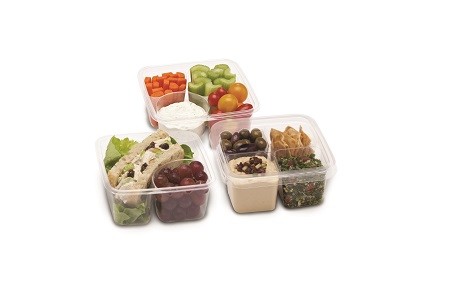First announced in 2021, NatureWorks is the process of constructing a new Ingeo™ PLA (polylactic acid) manufacturing complex in Nakhon Sawan, Thailand. This second facility will include production sites for lactic acid, lactide, and polymer that are designed to have both process and energy integration for increased efficiency of the manufacturing operation.
Located on the Nakhon Sawan Biocomplex (NBC) in Nakhon Sawan Province, the manufacturing site will have an annual capacity of 75,000 tonnes of Ingeo PLA biopolymer producing the full portfolio of commercially available Ingeo grades.

NatureWorks’ new manufacturing complex in Thailand will produce Ingeo™ PLA for growing Asian markets.
The facility will use abundant, locally grown sugarcane as the primary feedstock for the production process. “When planning for our second manufacturing facility, it was important to us that we locate the plant near a source of abundantly available raw material feedstocks. The availability of sugarcane in Thailand along with a highly skilled engineering workforce, and active interest from national agencies, made Thailand the best location for initiating our global expansion plans,” according to Rich Altice, President & CEO of NatureWorks.
In June 2022, site preparation for the new manufacturing facility at the NBC was completed and NatureWorks signed an agreement with Sino Thai Engineering and Construction PCL (STECON) to begin early-works construction for piling, underground piping, storm water management, and tank foundations. Currently underway, the early-works construction progress keeps completion of the facility on schedule for the second half of 2024.
Leading the development of materials from renewable sources
NatureWorks will be manufacturing its full portfolio of Ingeo biopolymer grades from the new Thailand facility. These Ingeo grades will be supplied to the growing domestic market for sustainable biomaterials in Thailand as well as exported to the greater Asia Pacific region, Europe, and North America.
“The demand for sustainable products continues to grow around the world. For more than 30 years, NatureWorks has participated in the circular economy, developing advanced biomaterials that contribute to a more sustainable future. This new facility is a critical next step in our global manufacturing expansion plans through which we can address demand and continue leading the development of high-performance, biobased materials made from renewable resources,” Mr. Altice adds.

Ingeo™ PLA from NatureWorks
The expanded global production of Ingeo biopolymers will support growth in markets including 3D printing and hygiene as well as compostable coffee capsules, tea bags, flexible packaging, and food serviceware that demand sustainable, low-carbon materials and require the high-performance attributes that Ingeo is uniquely suited to deliver.
“In the last several years, we have seen significant growth in demand for Ingeo biopolymer throughout the Asia Pacific region for both domestic consumption and export markets in the US and Europe. Thailand, specifically, is a regional leader in both the bioeconomy and circular economy with the implementation of their Bio-, Circular, and Green Economy (BCG) model, which makes it an ideal location for building an Ingeo PLA manufacturing facility that can expand our ability to sustainably supply both the country and the region,” Ian Toh, Commercial Director – Asia Pacific at NatureWorks explains.
NatureWorks is a pioneer in the development of bio-based materials that have a small carbon footprint and enables new after-use options with its Ingeo technology. As a company, it has developed many of the leading high-volume applications for PLA. In recent years, Ingeo has experienced significant growth as a bio-based material in a broad range of finished products. Due to its unique functionality, it has been used to replace petrochemical-based plastics with 100% renewable, biobased content and to enable more after-use options which include compostability, chemical recycling, and mechanical recycling.
Ingeo™ PLA meets stringent requirements of various applications
NatureWorks manufactures a portfolio of Ingeo PLA biopolymer grades tailored to differing applications and have a wide-range of performance properties. From this portfolio, Ingeo PLA is now used by NatureWorks’ downstream partners to make everything from compostable food serviceware, teabags and flexible food packaging to filaments for 3D printing or nonwovens for hygiene applications. The best applications for Ingeo PLA are ones that take advantage of the biopolymer’s unique intersection of performance and sustainability attributes.

Ingeo™ PLA biopolymer grades are available for various applications.
In more durable applications like 3D printing or hygiene masks, for example, Ingeo provides a combination of sustainability via biobased origins and a low carbon footprint with preferred performance attributes. In masks, Ingeo can be used to make a new spunbond fabric that makes a significantly more breathable, reusable, N95 filtering-level mask. The use of Ingeo can also increase the efficiency of a spunbond line by over 30% allowing for more masks to be manufactured. Using polypropylene alone in this type of application cannot achieve the same level of breathability or manufacturing efficiency.
In the 3D printing market, most desktop-style 3D printers already print with Ingeo because it’s an easy material to print with as it doesn’t warp or need a heated build board. Industrial-level users and large-format printers like it for the printability as well as properties like low warpage or heat resistance and impact strength similar to ABS.
The adoption of compostable tea bags made with Ingeo biopolymer has seen rapid growth, especially in the United Kingdom. Unilever’s new independent subsidiary for their tea business, ekaterra, noted during the COP26 conference that they had achieved a milestone of 42 billion compostable tea bags in the market. By the end of 2023, they expect to see that number rise to 60 billion. Continued growth of compostable tea bags is anticipated in other geographies as both brands and consumers increasingly want a functional solution for diverting those used tea leaves away from landfills and incineration to compost while still brewing a good cup of tea.
There is also growing interest from the market in coatings for paper products like cups or food containers. Paper is viewed favourably by many brands and consumers as it is derives from a natural, renewable source. Pairing paper with a biopolymer coating keeps the product fully biobased, and opens up new opportunities for applications and in after-use options. For example, when using an Ingeo extrusion coating on hot or cold paper cups, NatureWorks has achieved certifications that show the cup can be either industrially composted or recycled. The flexibility in how to responsibly dispose of the used paper cup is attractive as available waste infrastructure is so variable between geographies. In the future, NatureWorks sees potential for the expanded use of Ingeo biopolymers in paper coatings due to this flexibility in disposal and as its applications development research continues. In fact, a recent paper published in TAPPI Journal describes extrusion coatings process optimisations for increasing output and line speeds up to 150-300%.
By bringing together material performance and sustainability attributes in a biomaterial like Ingeo, it has become possible to engineer more sustainable applications that offer more after-use options like compostability and contribute towards mitigating climate change through a lower carbon footprint.














